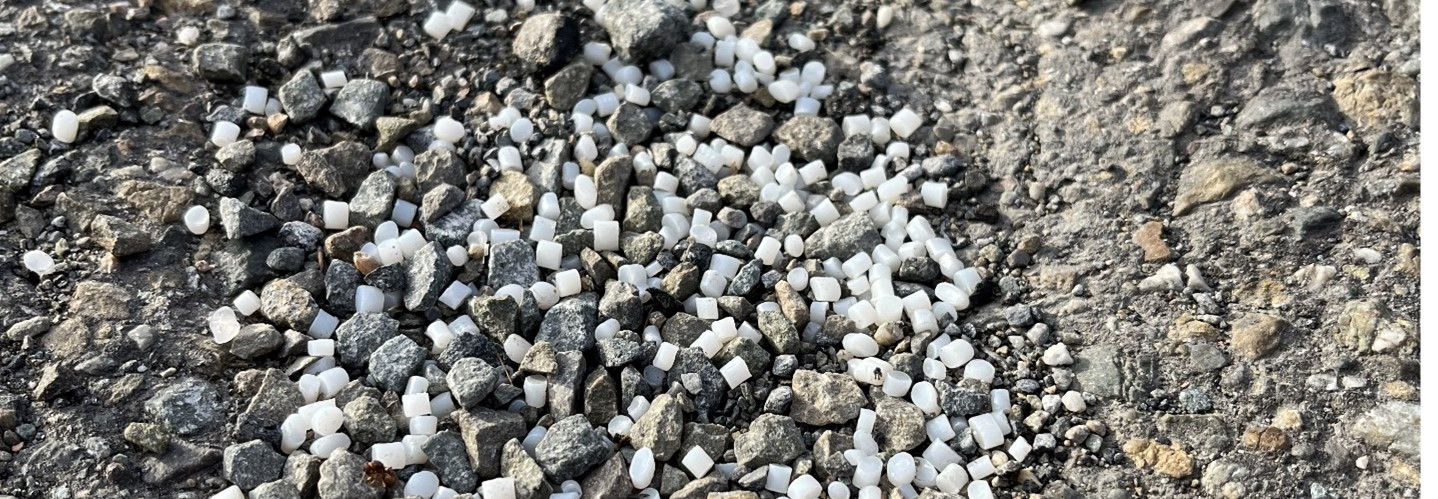The Écaussinnes site has been known for about ten years as a high place of pollution with Industrial Plastic Pellets (IPP), also called nurdles. Surfrider is launching a new campaign to ensure that this major source of pollution is strictly controlled.
Pellets, these industrial plastic granules that invade the ocean
The European Commission states that every year in Europe,160,000 tons of pellets are lost each year by industries in the European Union and end up in the environment, especially on our beaches and at sea.
These plastic beads, which can also exist in the form of flakes or powder of various colors and composition, are characterized by their small size and their high volatility and ability to diffuse in the environment. They are lost throughout the plastic production chain, from processing to distribution and recycling. Often, these losses are caused by poor industrial practices or transportation accidents.
These granules inevitably pollute the natural environment, carried by wind and rain to end up in river water systems and the ocean. They release chemical pollutants and end up on the shoreline or in the stomachs of certain species. Unfortunately, this is the second most important source of so-called primary microplastic pollution in our ocean.
Find out more on plastic pellets
The dumping of pellets in the industrial zone of Feluy
The Surfrider Coastal Defenders program aims to gather and better equip a community of volunteers capable of defending the interests of the ocean and the coastline against any project that could potentially harm them. In September 2022, a new campaign is launched in a high pollution area of pellets in the industrial zone of Feluy in Écaussinnes, Belgium. The local authorities reported the spill of pellets in the watercourse near the industrial complex. The same observation is made on several occasions in the vicinity of the plant. Various companies are involved in the production or handling of these plastic balls, including Total, Katoen Natie, Vos Logistics and Feluy Service Center.
The objective of this campaign is to make the Écaussinnes site an example of zero pellet losses to the environment. First of all, it is necessary to identify the places where this pollution accumulates and to have a clearer idea of the extent of this pollution: the presence of La Sennette near the industrial complex leads to fear that the pellets, which are extremely volatile, will spread to other tributary waterways. Surfrider Foundation volunteers are currently in a phase of contact with relevant actors and experts such as local authorities and associations involved in this type of pollution. They are also working on a protocol to be used to quantify the pellets. They will be able to rely on the expertise developed during other campaigns such as the one in Tarragona.

Find out more on the industrial zone of Feluy
The fight against plastic pollution, a fight of Surfrider Foundation
The campaign conducted in Écaussinnes also contributes to the broader claims made by Surfrider Foundation. These are aimed at new industrial practices insufficient to solve the problem of pellets. Indeed, voluntary initiatives such as Operation Clean Sweep, although promoted by the industry, demonstrate every day their ineffectiveness on the ground to prevent the loss of industrial plastic pellets. This campaign therefore illustrates the need for binding European, national and regional measures that guarantee independent and external control of their implementation.
Still too often, polluting industries are hardly or not at all sanctioned to the extent of the environmental damage they are responsible for. It is high time to act to finally put an end to this phenomenon. First and foremost, the European Union must reduce the production of plastics, with targets for quantity reduction and under strict deadlines. At present, plastic production is expected to double by 2035 and almost quadruple by 2050. If it continues to increase, so will the incidence of pollution from industrial plastic pellets.
Learn more about Operation Clean Sweep and other false ideas to fight plastic pollution

